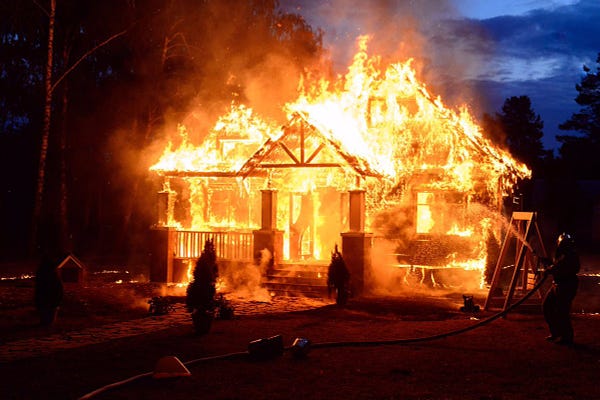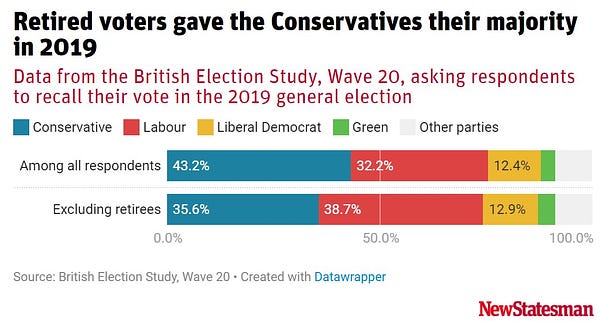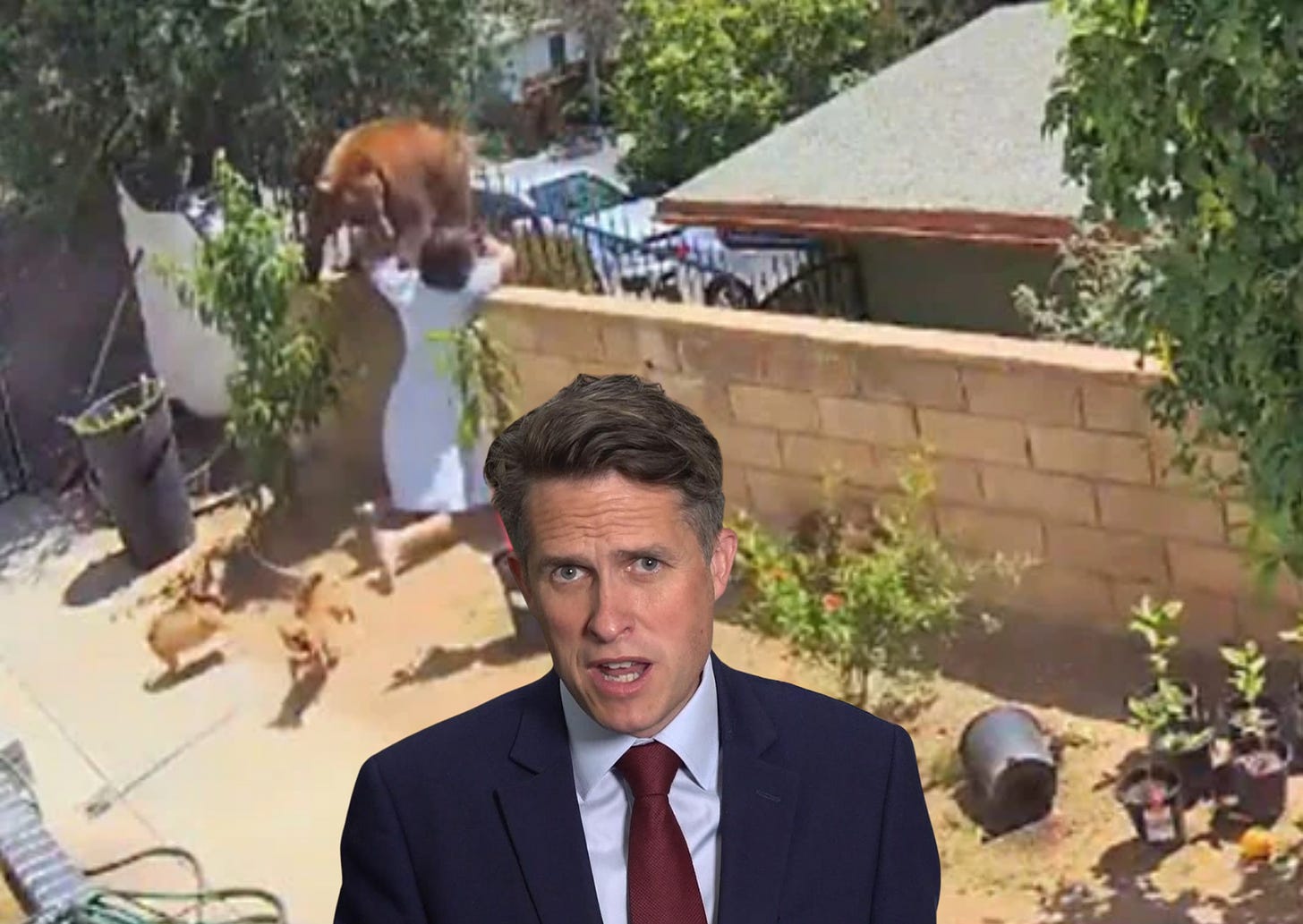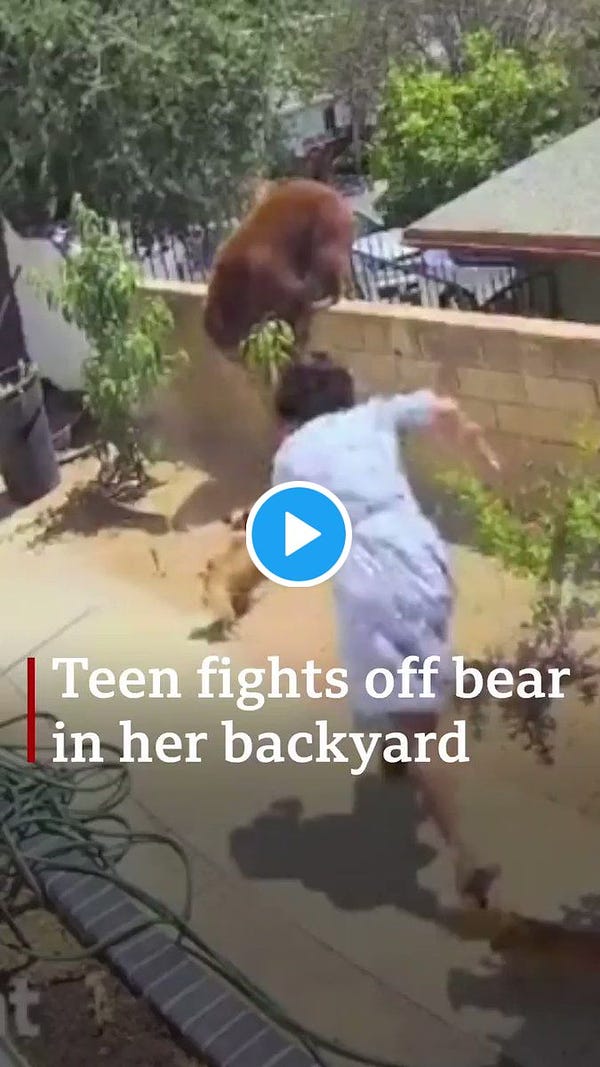The ‘bad’ bear: The education recovery scandal and how the British media picks its heroes and villains...
Yes, we are straying into the realm of metaphor.
‘Teen fights off bear to save dogs’
…that was a headline on a BBC World News story yesterday. It was accompanied by a video of a teenage girl pushing a bear off a wall.
But in some alternate reality where bears have TV stations, an ursine correspondent could easily have told the story as “Human girl strikes mother bear defending her cubs from canine aggressors”.
The single line of text in the news story accompanying the footage reads:
Footage shows the moment a teenage girl in California gets the better of a bear fighting with her pets.
But watch the video yourself, putting the framing out of your mind, and you’ll see the dogs go for the bear and her cubs before she retaliates. The dogs were the catalyst for the confrontation but the story is about the human teen ‘saving’ the pack from a bully-girl bear.
Since bears are unable to complain about fairness in reporting and media ethics, this example doesn’t actually matter, but it illustrates how framing works in the media. There is a gulf between the events shown in the video and the journalist’s interpretation of them.
This gap between material fact and analysis occurs many times a day. It’s often invisible until you compare how two different outlets report the same story. Take the UK government’s “education recovery plan” for England which was splashed across all the newspapers yesterday morning before the government’s advisor on the issue, Sir Kevan Collins, quit condemning the paltry funding.
On page 4 of yesterday’s Sun, the proposals were heralded as the “[Prime Minister’s] bid to help pupils make up for lost time” and gifted the headline and sub-deck…
£1.4 BN EXTRA TUITION
100m hours lessons boost
… with the paper’s deputy political editor Kate Ferguson writing:
Schoolkids in England are to get a whopping 100 million hours of extra tuition under plans to plug the massive Covid-shaped hole in their education.
… a massive £1.4 billion is being put aside to cover the cost of additional lessons.
The story did not mention Collins’ concerns, voiced before his resignation last night, nor include a quote from him or any of the education unions. Instead, the piece quotes only the Prime Minister and feckless fireplace salesman turned Education Secretary Gavin ‘ooh Betty’ Williamson.
It is not a news story, it’s a government press released pushed through The Sun’s patented tabloidiser.
Now, compare The Sun’s coverage with how the story was framed by its often equally insidious broadsheet stablemate The Times:
While The Sun slipped its coverage onto page 4, The Times put its story at the top of the front page with the headline Johnson accused of failing pupils with ‘cheap’ schools boost.
Henry Zeffman, Rachel Sylvester and Emma Yeomans are bylined on the piece and write:
Boris Johnson was accused of having ‘let down’ England’s children last night by only endorsing a small fraction of a £15 billion plan to rescue them from months of disrupted teaching.
The story quotes the education unions as well as the government sources and the Prime Minister, but still insists that Collins “backed the announcement”.


The Guardian, which headlined its story, Covid tuition catch-up plan dismissed as ‘inadequate’, and also placed it prominently on the front page, offered a rather different assessment of Collins’ response to the plan.
Peter Walker and Rachel Hall wrote:
While the official announcement of the new plan carried laudatory quotes from Gavin Williamson, the education secretary, and Boris Johnson, with the prime minister saying it ‘should give patents confidence’, the quote released from Collins was more circumspect.
I’m relatively unusual in that I tend to read at least four papers a day. If I hadn’t and had just read The Sun, Collins’ resignation hours later would have been a shock. After all, there was no hint in its reporting that the recovery plan was anything but a triumph. Even if I’d relied on The Times, the extent of his upset would not have been apparent to me.
This morning, Collins has written for The Times explaining his reasons, while Ferguson — who mentioned not a word about his anger yesterday — gives Sun readers a story headlined:
The story begins…
BORIS Johnson’s schools Catch Up Tsar has handed in his resignation tonight in fury over the paltry amount of cash given to pupils - saying he's risking "failing hundreds of thousands of pupils".
Sir Kevan Collins walked in fury after ministers ignored his plea for £15billion to help kids with their studies, only coughing up £1.4bn instead.
… which is curious. Yesterday, The Sun’s Kate Ferguson described that money as “a massive £1.4bn” but today The Sun’s Kate Ferguson is astounded that the government is “only coughing up £1.4bn.”
The Telegraph, which goes big on a story headlined Education catch-up tsar quits after Treasury waters down £15bn rescue package today, gave space yesterday to an op-ed from Gavin Williamson headlined We must support pupils to catch up on the learning that they have lost, in which the Education Secretary claimed:
This is the third huge step forward from the Government to build back better and support you to recover from the pandemic.
I will keep working to deliver what works, and what’s needed to make sure every child has the support they need.
It was about as convincing as Williamson’s great influence Frank Spencer trying to stay upright on rollerskates.


There were numerous examples of the gap between reality and framing in yesterday’s newspapers alone, from wildly irresponsible reporting on the “zero Covid deaths” story (with several papers including The Daily Mail neglecting to mention that the figure was not final) to the bizarre range of responses to a picture of Keir Starmer as a student.
Of course, newspapers with different political positions will report stories differently but the ease with which many British journalists commit acts of elision, diversion, distortion, and deception should be shocking but simply isn’t. To get a true picture of a story like the one on the education recovery plan, it’s often necessary to triangulate — looking at several sources and even digging out primary sources to get even a fuzzy sense of what’s actually going on.
The question of whether spending on children’s education is properly treated is serious enough but the “bad bear” problem besets every major story. It’s why the highly critical report into Islamophobia in the Conservative Party slipped out of the headlines faster and more dramatically than a dissident falling down some curiously buttered stairs. It’s also why accusations against some people end up hidden deep into the paper while others are splashed on the front page.
The situation is made worse by journalists accepting political rhetoric whole cloth and incorporating it into their reports without any kind of circumspection or analysis. So “the red wall” — a concept that really only became common parlance in late-2019 — is now bandied about as if it has always existed, and the phrase “levelling up” trips reporters’ tongues as if it is freighted with meaning rather than simply a Conservative Party electoral slogan.


Similarly, columnist after columnist has written about how Labour lost its working-class support in the 2019 election and the Tories are now the party of the workers… but the figures don’t remotely support that new received wisdom.
A piece from Ben Walker in the New Statesman yesterday suggests that, in fact, the Tories gained their majority thanks to retired people and that Labour — pre-Starmer at least — had the largest share of votes from low-income workers in the 2019 election. Walker says:
[It] is becoming increasingly apparent, elections cannot be won without sizeable representation among Britain’s old.
But that’s a more complicated story to tell than “Labour lost the working class and the Red Wall bloody loves Boris”. Similarly, many of the culture war columns that argue that Labour has ‘lost the North’ because of an obsession with ‘trendy’ identity politics are totally demolished by data — which suggest the “Red Wall” voters’ views on social issues are broadly in line with the rest of the country.



But commentators like Douglas Murray, who wrote again for UnHerd yesterday about why the culture war definitely, definitely exists, need the bear to be bad. Their entire schtick is predicated on the idea that while the Right appears to be in the ascendence, it’s really the Left driving the agenda and that is sinister.
The British right-wing press has both a long memory — it can recall any slight or scandal with incredible recall — and tactical amnesia. The things it gets catastrophically wrong simply disappear, just like that story Tom Newton-Dunn stuck on the front page of The Sun which was based on a neo-nazi conspiracy theory. So it is that Kate Ferguson can hail a government plan one day and be deeply disappointed the next.
One day the bear is defending her cubs from angry dogs, the next the dogs are the goodies and the bear is unquestionably bad. It doesn’t matter if you’ve watched the footage or not, the newspapers will tell you their version of the story with unshakeable conviction.
You see, the bear is bad and always has been.





